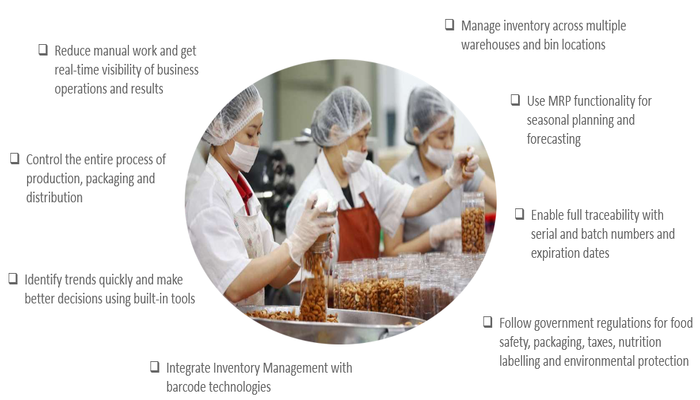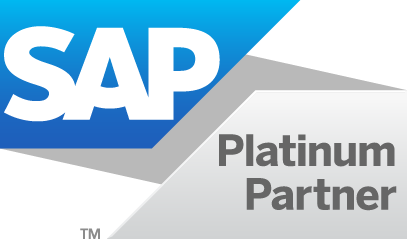SAP Business One has been in high demand recently. Many companies, regardless of their size and the products and services they offer, have already embraced SAP cloud-based software solutions to enhance the business. These solutions automate your management and marketing tasks, making it a whole lot easier for you to focus on productive activities rather than accounting and management. Similarly, SAP business solutions have proven quite useful for the food and beverage industry.
The food industries have witnessed a great revolution over the past few years. But, as the industry is growing at a rapid rate, it has to face certain challenges and strong competition. Whether it is a restaurant or a food supplier, the business owners need to adopt the latest technology to deal with these challenges that include maintaining food quality and hygiene, managing inventory, following the latest compliance, and automating the management tasks for streamlined business operations.
The Challenges and Trends in the Food Industry
Every year, we get to see new trends in the food and beverage sector. For instance, people have started to shop for vegetables, fresh fruits, meat, and even prepared food online. The restaurants and retailers are hiring delivery men to promote fast and safe food delivery. It has become quite flexible for customers to access their favourite food items.
2020 brought new challenges for the food and beverage industry. The F&B market vendors could experience a long-term supply chain and value chain disruption due to the coronavirus pandemic. On top of that, they need to face other 8 top challenges as listed in the image below:

Source: Global Market Insights
Statista’s data shows that online grocery is growing rapidly in Singapore and Malaysia and are already ahead of the US. Singaporeans and Malaysians have embraced online grocery shopping more quickly than their Southeast-Asian neighbours. The study suggests that e-commerce has a promising future in Singapore and Malaysia.

With all these trends and challenges, it has become important for food and beverage companies to automate their management work by integrating ERP solutions. They need a solution that can automate product packaging, labelling, and tracking. Moreover, they need software that could ensure the company meets the rigid government’s regulations regarding food processing.
The impacts of SAP Business One on the Food and Beverage Industry
Not only do they automate the regular management and marketing tasks, but they ensure smoother business operations and seamless communication between the team. The owner gets to decide which employees can access the software. To name a few, the software helps:
- Access and manage information about the products across the whole supply network
- Reduce the time and efforts in marketing
- Ensure quick decision making
- Provide you with accurate and up-to-date information about the products and services
- Handle formulations as well as reformulations of different products
- Cut down unnecessary expenses by minimizing the risk of manual errors
- Automate different management and marketing tasks
1. Inventory Management
Inventory management is one of the most crucial yet challenging tasks for food and beverage companies. SAP Business One has a separate inventory module that manages warehouse and inventory. It records the current inventory status of both raw materials and finished products. The solution is so advanced that it can notify the business owner before they running out of inventory stock and they can re-order immediately. So, you don’t have to generate stock reports manually and also regularly to identify the items that are running low. The software will check, compare, and manage the inventory every day. Efficient stock control allows you to have the right amount of stock in the right place at the right time.
2. Records Management
Food and beverage businesses are supposed to comply with the Food Safety Modernization Act (FSMA) as well as other government regulations. To do that effectively, business owners need to quit the pen-paper based approach. If you still rely on manual accounting and financial statements, it is high time you made a shift to ERP solutions.
An important part of any business is recording day-to-day transactions. SAP Business One has proven an effective way to digitize your food industry and the basic management operations. It gives you an opportunity to adapt to the digital record management system. It helps you record information and retrieve them if needed. Paper-based documents are likely to be misplaced and lost. Unless you have a backup, you won’t be able to retrieve this information. As a result, you will have to create these documents all over again.
If you go digital with SAP Business One ERP solution, then you don’t have to worry about the record management part. Once you get all the necessary business information transferred to the digital medium, you will never lose it. In the worst case, even if you lose the information, the software allows you to retrieve the records. With this software, you can extract any information you want in a fraction of second – be it your employee’s details or the information about your previous years’ financial statements.
3. Compliance and Government Regulations
Food and Drug Administration (FDA) has set certain regulations for food and beverage businesses. The companies need to ensure that the products they launch in the market are safe for consumption. They must comply with government regulations. If a customer complains about certain products, packaging, or marketing, then FDA will look into the matter and take strict action against the manufacturer and supplier. There is a good chance the government will cancel the manufacturing license of the producer.
SAP Business One is known for managing the business operations right from scratch to food distribution. It offers a broad range of functionalities, including recipe management, warehouse and inventory management, production scheduling, and so on. The tool help manage food processing.
A major challenge faced by the food and beverage industry is to pass government compliance and come up with 100% safe and accurate food products. It is difficult for businesses to measure the compliance and quality of the food throughout the supply network without an automated solution like SAP Business One.
It is possible that food industries can face production issues at some point. If they have a quality and automated business software integrated into their business, then addressing such quality and compliance-related issues will be easier for the business owner.
4. Packaging Requirements
Based on the type and nature of the food, the manufacturer or supplier might pack them in different packaging. For example, tin and glass are used for the packaging of frozen foods, while regular plastic or paper bags are used for dry food items. SAP Business One handles the packaging records for different foods. Not only does it help with the record management, but SAP Business One connects packaging with the inventory for smoother and faster operations.

5. Process Automation
Automating workflow can help reduce the workload of the food and beverage companies. A plethora of tasks is supposed to be completed by food companies on a daily basis. This includes recording the regular transaction, receiving payments, monitoring inventory, preparing financial statements and multiple accounts, and working on marketing-related tasks.
The job of a food and beverage business owner gets easier if these tasks are automated. Not only do they reduce the burden, but automation ensures minimal chances of errors. This helps you save thousands of dollars in the long run. Accessing data and sharing it with your team members, business associates, investors, and clients have become a piece of cake with the SAP Business One ERP solution.
The Overall Benefits of SAP Business One for the Food and Beverage Industry
Ninety-nine of the top hundred world’s largest consumer products companies such as Coco-Cola and Nestle are using SAP Business Management software. The major reason for this sudden growth in the food industry is the increasing customer demand and expectations. A large number of people have embraced online grocery shopping. They place an order of their required food item online (mostly through the grocery mobile app or an eCommerce website) and have the food delivered at their home. That’s how simple it is to do the grocery shopping today.
They have to adapt to digital marketing and online business to survive the competition. ERP solutions have become a necessity. SAP Business One not only specializes in offering quality ERP solutions, but it offers CRM (customer relationship management) solutions that help you with customers’ data management. This offers the food industry a great opportunity to offer personalized services to each customer i.e. the food and beverage recommendation based on their past purchase pattern and their preference. Other benefits of the solutions are as follows:
- SAP Business One ERP solution has the ability to manage finance, inventory, cash flow, purchase, sales, distribution, production, and marketing tasks seamlessly
- Offers recipe management function
- Reduces errors and interruption
- Offers high productivity
- Can manage inventory in different warehouses
- Compatible with third-party solutions

Conclusion
The food industry has to face multiple challenges to provide high-quality and safe products to its customers. From procuring raw materials to supplying finished goods, FDA has implemented some strict regulations that each food and beverage company has to abide by. So, they have to follow these regulations while maintaining the quality of food. Additionally, they have to carry out a host of management and marketing tasks to build their customer base and streamline the supply chain.
This can impact the productivity and quality of the finished product. It is quite important for food & beverage companies to consider investing on SAP Business One for smoother and faster business operations.














